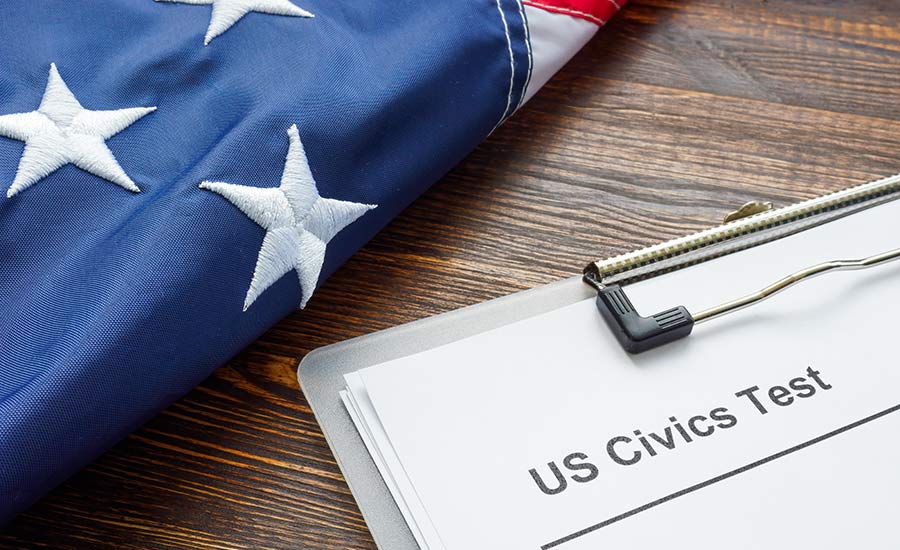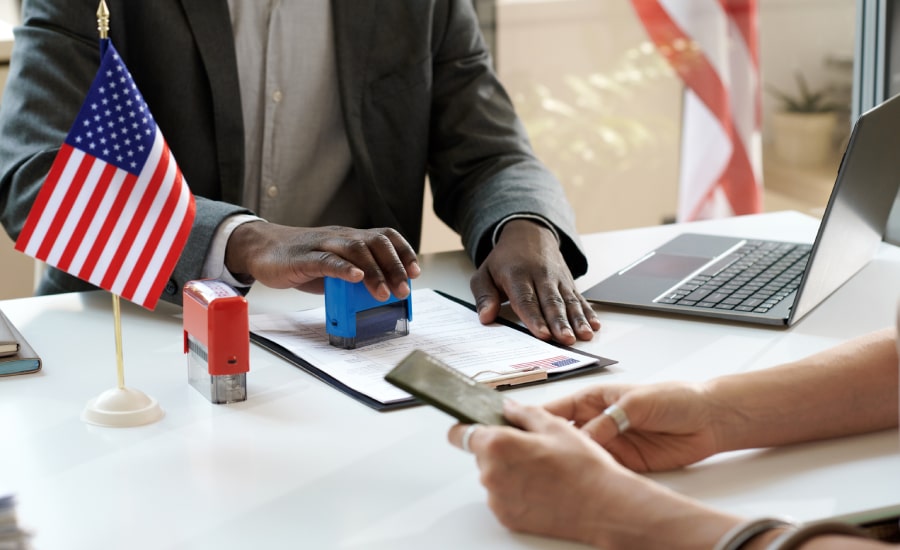

The journey towards becoming a citizen of the United States can be both exciting and challenging and one of the key components of this process is passing the civics portion of the U.S. citizenship test.
We will share the types of U.S. citizenship questions you may be asked and provide examples along with the correct answers. We will also suggest efficient study strategies and tips to overcome potential challenges when preparing for your citizenship test.
Types Of Questions In The US Citizenship Civics Test
The U.S. citizenship civics test includes several types of questions that can be grouped into three different categories.
American Government Questions
The American Government section includes questions about:
- The principles of American democracy, such as the Constitution, the Bill of Rights, and the concept of self-government
- The system of government, focusing on the structure and functions of the federal government
- The rights and responsibilities of U.S. citizens
American History Questions
The American History section includes questions about three main periods:
- The Colonial Period and Independence, which covers early American history, the American Revolution, and the Declaration of Independence
- The 1800s, which focuses on important events and figures in the 19th century
- Recent American history, including major events and developments in the 20th century and beyond
Integrated Civics Questions
The Integrated Civics section includes questions about:
- U.S. geography, such as U.S. states, capitals, and important landmarks
- U.S. symbols, such as the flag, the national anthem, and their meanings
- U.S. holidays and their historical significance
US Citizenship Test: 10 Questions About American Government
So, what exactly can you be asked during your civics test? Here are 10 questions from the USCIS list related to American government.
Some questions in the USCIS’ list contain more than one correct answer, so you can choose one of those when the officer asks you the question or two, if the question explicitly states that.
1. How many amendments does the Constitution have?
Answer: Twenty-seven (27)
2. What is the supreme law of the land?
Answer: The Constitution
3. What are the two rights in the Declaration of Independence?
Answer (choose one of the correct answers below):
- Life
- Liberty
- Pursuit of happiness
4. Who is in charge of the executive branch?
Answer: The President
5. How many U.S. Senators are there?
Answer: One hundred (100)
6. In what month do we vote for President?
Answer: November
7. What does the judicial branch do?
Answer (choose one of the correct answers below):
- Reviews laws
- Explains laws
- Resolves disputes (disagreements)
- Decides if a law goes against the Constitution
8. What are two ways that Americans can participate in their democracy?
Answer (choose two from the list below):
- Vote
- Join a political party
- Help with a campaign
- Join a civic group
- Join a community group
- Give an elected official your opinion on an issue
- Call Senators and Representatives
- Publicly support or oppose an issue or policy
- Run for office
- Write to a newspaper
9. How old do citizens have to be to vote for President?
Answer: Eighteen (18) and older
10. The House of Representatives has how many voting members?
Answer: Four hundred thirty-five (435)
US Citizenship Test: 10 Questions About American History
Below you will find 10 questions from the U.S. citizenship civics test that focus on important moments in American history.
1. Who lived in America before the Europeans arrived?
Answer (choose one of the correct answers below):
- American Indians
- Native Americans
2. Who wrote the Declaration of Independence?
Answer: (Thomas) Jefferson
3. The Federalist Papers supported the passage of the U.S. Constitution. Name one of the writers.
Answer (choose one of the correct answers below):
- (James) Madison
- (Alexander) Hamilton
- (John) Jay
- Publius
4. What territory did the United States buy from France in 1803?
Answer (choose one of the correct answers below):
- The Louisiana Territory
- Louisiana
5. Name one problem that led to the Civil War.
Answer (choose one of the correct answers below):
- Slavery
- Economic reasons
- States’ rights
6. What did Susan B. Anthony do?
Answer (choose one of the correct answers below):
- Fought for women’s rights
- Fought for civil rights
7. What was one important thing that Abraham Lincoln did?
Answer (choose one of the correct answers below):
- Freed the slaves (Emancipation Proclamation)
- Saved (or preserved) the Union
- Led the United States during the Civil War
8. Who was President during World War I?
Answer: (Woodrow) Wilson
9. What did Martin Luther King, Jr. Do?
Answer (choose one of the correct answers below):
- Fought for civil rights
- Worked for equality for all Americans
10. What major event happened on September 11, 2001, in the United States?
Answer: Terrorists attacked the United States
US Citizenship Test: 10 Questions About Integrated Civics
Lastly, take a look at 10 questions from the USCIS list that cover integrated civics topics.
1. Name one of the two longest rivers in the United States.
Answer (choose one of the correct answers below):
- Missouri (River)
- Mississippi (River)
2. Name one state that borders Mexico.
Answer (choose one of the correct answers below):
- California
- Arizona
- New Mexico
- Texas
3. What is the capital of the United States?
Answer: Washington, D.C
4. Name one U.S. territory.
Answer (choose one of the correct answers below):
- Puerto Rico
- U.S. Virgin Islands
- American Samoa
- Northern Mariana Islands
- Guam
5. What ocean is on the East Coast of the United States?
Answer: Atlantic (Ocean)
6. Why does the flag have 13 stripes?
Answer (choose one of the correct answers below):
- Because there were 13 original colonies
- Because the stripes represent the original colonies
7. Why does the flag have 50 stars?
Answer (choose one of the correct answers below):
- Because there is one star for each state
- Because each star represents a state
- Because there are 50 states
8. What is the name of the national anthem?
Answer: The Star-Spangled Banner
9. When do we celebrate Independence Day?
Answer: July 4
10. Name two national U.S. holidays.
Answer (choose two from the list below):
- New Year’s Day
- Martin Luther King, Jr. Day
- Presidents’ Day
- Memorial Day
- Independence Day
- Labor Day
- Columbus Day
- Veterans Day
- Thanksgiving
- Christmas
How Many US Citizenship Test Questions You Need To Answer To Pass The Civics Test
To pass the civics portion of the U.S. citizenship test, you need to answer at least 6 out of 10 questions correctly.
A USCIS officer will ask you up to 10 questions from a list of 100 possible questions. The questions are randomly selected and vary in difficulty.
If you answer 6 questions correctly before reaching the 10th question, the officer will stop asking additional questions, as you have already passed this portion of the test and have shown enough knowledge of U.S. civics.

What Challenges You May Face With US Citizenship Test Questions & Tips to Overcome Them
As a non-native speaker, you might face various challenges when answering U.S. citizenship test questions. Knowing how to handle them will help you complete the exam successfully.
Complex & Unfamiliar Topics
It may be difficult for you to understand details about U.S. history, government, and civics principles — especially if these topics are not familiar to you.
Tip: Use visual aids like charts, timelines, and maps to get knowledge of historical and government structures. Break down information into smaller parts that you can process and go through these sections at regular intervals.
Memorizing Facts
Memorizing numerous facts about American civics can be challenging as this requires both understanding the concept and recalling this specific information during the test.
Tip: Use mnemonic devices, such as acronyms or rhymes, to create easy-to-remember associations along with flashcards that will allow you to test yourself.
Understanding Questions
You may have difficulties understanding the phrasing of questions, as it may differ from everyday language.
Tip: Learn the format and wording of typical civics questions. Practice with sample questions and review explanations for each answer to understand common patterns and language used.
Test Anxiety
Feeling nervous or anxious during the test can affect your performance, even if you are well prepared.
Tip: Practice relaxation techniques such as deep breathing, meditation, or visualization before and during the test. Take multiple practice tests in a simulated test environment to build confidence and reduce stress.
Study Strategies For The US Citizenship Test
Learning effective study strategies will help you take a structured approach to boost your understanding and confidence effectively.
Use Study Materials From Official Sources
The U.S. Citizenship and Immigration Services (USCIS) provides a selection of official study materials to help applicants prepare for the civics test. These include the 100 civics questions and answers, flashcards, and practice tests.
Download the complete list of 100 questions, then break them down into groups of several questions to study each day.
Flashcards can help you test and reinforce your memory while practice tests can help you get used to the format and timing of the questions.
Join A Citizenship Class Or Study Group
Taking part in a citizenship class or study group at community centers, libraries, and adult education programs can provide structured learning and additional support.
These classes are designed to cover the civics questions in depth, providing opportunities for questions and discussions.
Participating in a study group also allows you to practice with peers, share resources, and stay motivated.
Incorporate Multimedia Resources
Diversifying your study strategies by using multimedia resources can help you understand civics material better.
For example, watching educational videos about American history and government can provide visual and auditory learning that complements traditional reading.
Podcasts with discussions on civics topics can be another way to learn on the go while apps and online quizzes can make studying more enjoyable, allowing you to track your progress and identify areas that need more focus.

Need Help With Your US Citizenship Test? Contact Spar & Bernstein
The Law Offices of Spar & Bernstein have six decades of experience in immigration and an impressive collection of success stories.
From family and employment immigration to citizenship and naturalization, our knowledgeable attorneys can help you gather and file the needed documents and pursue your American dream.
If you want to apply for U.S. citizenship, we will review your eligibility, help you complete and submit your naturalization application, conduct mock interviews to prepare you for the interview and provide resources and coaching focused on the citizenship test.
During the naturalization process, our team will be by your side to answer your questions, address concerns, and provide updates on your application status.
FAQs About The US Citizenship Civics Test
For more insights into the civics part of the U.S. citizenship exam, check out our FAQs below.
Can I take the civics test in my native language?
No, the civics test is administered in English so that you can demonstrate your ability to understand and respond to questions in English.
What happens if I fail the civics test?
If you fail the civics test, you may be given a second opportunity to take the test on a different date. The second date is typically within 60-90 days of the first interview. Failing the test for a second time will result in the denial of the naturalization application.
What can I do if I have difficulty understanding a question during the test?
If you have difficulty understanding a question during the civics test, ask the USCIS officer to repeat or rephrase the question.





